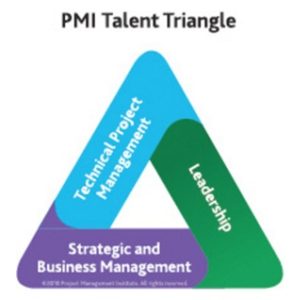By Helena Lui PMI’s Talent Triangle highlights that the ideal project manager has a combination of technical project management skills, leadership and strategic and business management. If you thought technical skills was all you need, think again.

In today’s environment, increasingly, companies are looking for project managers who can not only execute, but also strategize. Let’s take a look at each of these three components and what they mean: Technical Project Management A project manager needs to be proficient with the 10 knowledge areas listed in the PMBOK guide, including managing scope, time, cost, risk, and stakeholders. (In case you are taking your PMP exam, here’s a video showing you a few quick ways to memorize the 10 knowledge areas.) The technical component of project management involves the project manager tracking the limited resources assigned to the project and allocating these resources appropriately to complete the project’s objectives. Relying solely on technical project management is not good enough because this type of management is sometimes unflatteringly referred to as “management by spreadsheet.” Strategic and Business Management A good project manager understands how his or her project fits within the overall project strategy. Without a clear understanding, the project manager can misinterpret the scope or misled the team. When project managers do not have a clear idea of how their project fit within the strategic goals of the organization, the projects also have a higher rate of failure. A project manager with a strong strategic vision can contribute new ideas to the organization, and contribute more to the organization’s bottom line. Thus, many organizations are already including project managers in their strategic meetings and asking for their feedback. When the project manager’s feedback is taken into consideration, s/he will be more motivated to see the vision into fruition. Leadership The project’s success depends on the people working on it. A good project manager understands that different team members have different personalities and needs, and s/he can uses these assessments to motivate the team to accomplish the project’s objectives. A project manager with strong leadership skills knows when to give the appropriate rewards and punishments. S/he not only has a high IQ, but a high EQ as well. While technical skills are at the core of being a good project manager, with increasing competition, companies are looking for project managers with strategic vision and leadership skills. What organizations are realizing is that pure technical management does not motivate and excite a team, which increases the risk of project failure. The project manager is the team’s first line of contact in the organization. If the project manager doesn’t know how the project contribute to the organization’s bottom line, the team probably will not know either. If the team does not understand what they are working towards, they will be less motivated to give their 100% to the project. Currently, many organizations have a group for strategy and another one for implementation, sometimes leading to miscommunication between the two groups. To mitigate the risk of miscommunication, organizations are including project managers in their strategy sessions and asking for their feedback, instead of pushing ideas on them. Thus, increasingly, organizations are demanding their project managers be both a tactician and a strategist. Companies are willing to pay more for project managers who have a broader vision for managing projects. More specifically, they want people who have all the skills in the Talent Triangle because these people have long term strategic objectives that can increase revenues.




